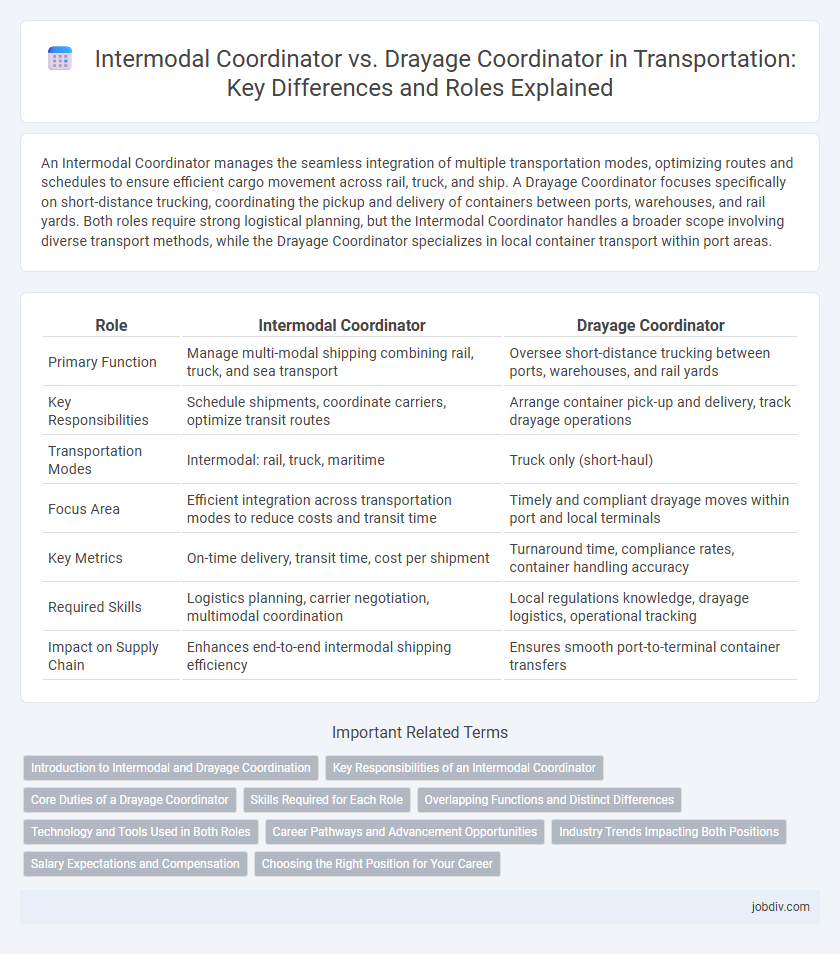An Intermodal Coordinator manages the seamless integration of multiple transportation modes, optimizing routes and schedules to ensure efficient cargo movement across rail, truck, and ship. A Drayage Coordinator focuses specifically on short-distance trucking, coordinating the pickup and delivery of containers between ports, warehouses, and rail yards. Both roles require strong logistical planning, but the Intermodal Coordinator handles a broader scope involving diverse transport methods, while the Drayage Coordinator specializes in local container transport within port areas.
Table of Comparison
| Role | Intermodal Coordinator | Drayage Coordinator |
|---|---|---|
| Primary Function | Manage multi-modal shipping combining rail, truck, and sea transport | Oversee short-distance trucking between ports, warehouses, and rail yards |
| Key Responsibilities | Schedule shipments, coordinate carriers, optimize transit routes | Arrange container pick-up and delivery, track drayage operations |
| Transportation Modes | Intermodal: rail, truck, maritime | Truck only (short-haul) |
| Focus Area | Efficient integration across transportation modes to reduce costs and transit time | Timely and compliant drayage moves within port and local terminals |
| Key Metrics | On-time delivery, transit time, cost per shipment | Turnaround time, compliance rates, container handling accuracy |
| Required Skills | Logistics planning, carrier negotiation, multimodal coordination | Local regulations knowledge, drayage logistics, operational tracking |
| Impact on Supply Chain | Enhances end-to-end intermodal shipping efficiency | Ensures smooth port-to-terminal container transfers |
Introduction to Intermodal and Drayage Coordination
Intermodal coordination integrates multiple modes of transportation, such as rail and truck, to optimize cargo movement, enhancing efficiency and reducing costs. Drayage coordination specifically manages the short-distance transport of goods, often from ports to warehouses, ensuring timely and precise container handling. Both roles require expertise in logistics, but intermodal coordinators oversee broader multimodal networks, while drayage coordinators focus on local container transfer operations.
Key Responsibilities of an Intermodal Coordinator
An Intermodal Coordinator manages the seamless transfer of cargo across multiple transportation modes such as rail, truck, and ship, ensuring efficient scheduling and adherence to delivery deadlines. They coordinate with carriers, monitor shipment status, and resolve transit issues to optimize supply chain flow. Unlike a Drayage Coordinator who focuses primarily on short-distance trucking from ports to warehouses, the Intermodal Coordinator oversees the entire multimodal transport process for enhanced logistical integration.
Core Duties of a Drayage Coordinator
A Drayage Coordinator manages the short-distance transport of shipping containers between ports, warehouses, and distribution centers, ensuring timely and efficient container movement. Core duties include scheduling drayage trucks, coordinating pickup and delivery times, and communicating with carriers to resolve delays or issues. The role requires a thorough understanding of port regulations, container handling, and effective logistics coordination to optimize intermodal supply chain operations.
Skills Required for Each Role
Intermodal Coordinators require expertise in managing multiple transportation modes, understanding container logistics, and coordinating schedules to optimize freight movement efficiently. Drayage Coordinators must excel in local terminal operations, managing short-haul truck movements, and navigating port regulations to ensure timely delivery between ports and warehouses. Both roles demand strong communication skills, attention to detail, and proficiency in transportation management systems (TMS) for seamless coordination.
Overlapping Functions and Distinct Differences
Intermodal Coordinators and Drayage Coordinators both manage the flow of freight but differ in scope and operational focus; Intermodal Coordinators oversee the entire multimodal transport process, coordinating rail, truck, and sometimes ocean carriers to optimize transit times and costs. Drayage Coordinators specialize in short-distance trucking that moves containers between ports, rail yards, and warehouses, focusing on local logistics and container handling efficiency. Both roles require expertise in scheduling, carrier management, and regulatory compliance, yet Intermodal Coordinators emphasize broader network integration while Drayage Coordinators concentrate on the critical last-mile link in supply chains.
Technology and Tools Used in Both Roles
Intermodal Coordinators leverage advanced transportation management systems (TMS) and real-time tracking software to optimize the seamless integration of multiple transportation modes, ensuring efficient cargo transitions. Drayage Coordinators primarily utilize port-specific terminal operating systems (TOS) and GPS-enabled dispatch tools to manage short-haul container movements between ports and distribution centers. Both roles increasingly implement automation and data analytics platforms to enhance visibility, improve scheduling accuracy, and reduce operational costs in the supply chain.
Career Pathways and Advancement Opportunities
Intermodal Coordinators specialize in managing the transfer of cargo between different transportation modes like rail, truck, and ship, offering career advancement into logistics management and supply chain strategy roles. Drayage Coordinators focus on short-distance trucking logistics, facilitating container movements between ports and warehouses, often progressing toward operations management and freight brokerage positions. Both roles provide unique pathways within transportation, with Intermodal Coordinators typically advancing toward broader multimodal logistics leadership, while Drayage Coordinators develop expertise in last-mile delivery and port logistics management.
Industry Trends Impacting Both Positions
Rising demand for sustainable logistics solutions drives intermodal coordinators to optimize multimodal freight networks, enhancing efficiency and reducing carbon emissions. Drayage coordinators face increasing regulatory pressures and technological integration challenges as ports adopt automated systems and stricter environmental standards. Both roles must adapt to advancements in digital freight platforms and real-time data analytics to maintain competitive supply chain operations.
Salary Expectations and Compensation
Intermodal Coordinators typically earn between $55,000 and $75,000 annually, reflecting responsibilities that cover multiple transportation modes and logistics planning. Drayage Coordinators usually have salaries ranging from $45,000 to $65,000, with compensation influenced by expertise in managing short-distance freight movement, especially port-to-warehouse transfers. Benefits packages for both roles may include performance bonuses, health insurance, and opportunities for overtime pay, enhancing overall compensation.
Choosing the Right Position for Your Career
Choosing between an Intermodal Coordinator and a Drayage Coordinator depends on your expertise in logistics operations and interest in specific transportation modes. Intermodal Coordinators oversee the seamless transfer of goods across multiple transportation methods, optimizing efficiency in complex supply chains. Drayage Coordinators specialize in managing short-distance freight movements, focusing on port-to-warehouse or terminal-to-distribution center deliveries, requiring strong local knowledge and coordination skills.
Intermodal Coordinator vs Drayage Coordinator Infographic

 jobdiv.com
jobdiv.com